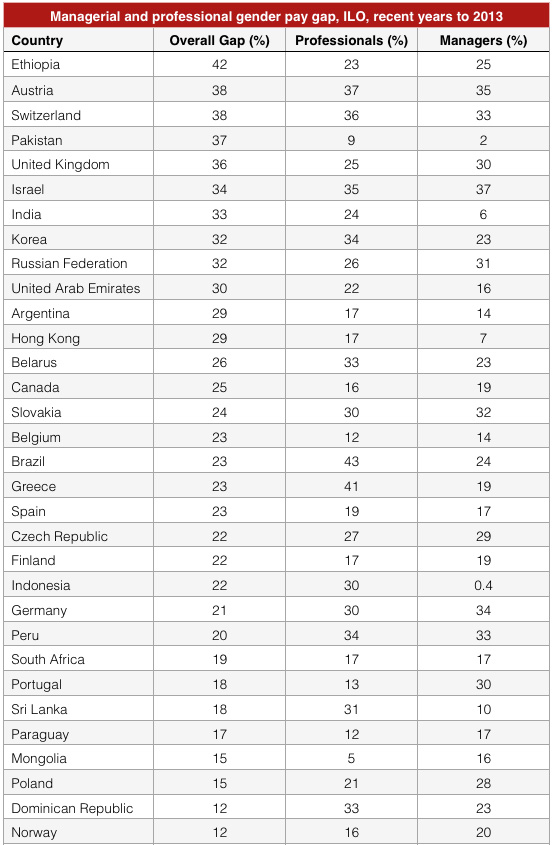https://youtu.be/L-EmDy3w1X8?t=55s
Patricia Arquette said it best, ‘It’s our time to have wage equality‘ . Women all over the world face this same problem. According to the last report of the International Labour Organization, it remains clear: the pay gap is huge.Women in leadership are movie stars who work hard, shine brightly and contribute enormously to the overall success of the production—yet they make substantially less than their male counterparts.
This would be an important issue in itself—though it runs much deeper. Women not only make less, but lag far behind men at the corporate level.

Here we will just focus on the wage issue, look at some of the root causes and see how we can eradicate the plague. Just some of the issues I’ve been hearing in my discussions with prominent corporate women include the following:
Women define success in broader terms than men do so we don’t negotiate as hard for money.
Money is a consideration, but it is one of many goals. And as is widely known, when you negotiate with more than one goal in mind, you need to be more flexible.
Yes we are interested in climbing the corporate ladder. Yes we are interested in being recognized. Yes we want to be well paid. Of course we do. But we’re not willing to pay any price . We’re not willing to sacrifice our families and social lives. Most women, myself included, are not willing to miss important family, social, and personal events for the sake of networking, impression management, and accommodating outdated corporate rules.
Fuencisla Clemares, Google Sales VP in Spain, told me a similar story. When she was at McKinsey, the IESE MBA graduate and mother of three successfully negotiated the terms of her maternity leave—not in relation to pay but to flexibility. Later, while pregnant with her second child she negotiated the terms of her contract with Carrefour to ensure she had the time and energy to spend with the newborn. Again she negotiated well – again not for pay. And most importantly, she had to negotiate with her husband, so that both their careers would be compatible.
Women include other’s interests in decision-making.
That is, we consider any positive (or negative) outcomes that may affect our significant others (parents, children, spouses, friends) as part of our total remuneration. If relocation overseas would negatively impact on our spouse, we don’t accept , no matter how much we are offered. But if our children would benefit from living abroad, we would consider that part of the package and not feel the need to negotiate hard for more money.
I’ve heard this same thing from many women who have had experiences of relocation in a foreign country –most while they were single. These women would only consider repeating the experience if their spouses could make good professional use of the time abroad by taking an MBA or freelancing. Most men I have spoken to said they would be willing to take a second expatriate experience if it were beneficial to their career. No reference to their wives’ careers. Full stop.
Carmen Becerril, speaking out of the record after a formal discussion on women on corporate boards, told me she had the same experience. She went on to speak with great pride and satisfaction about what she considers her best achievement: the work that the Foundation she helped start in Peru does to empower families – and mostly the women who head those families.
Women attribute success to external factors.
Thus, women mete out merit. We recognize other people’s merits and thank others for their contributions . All this is great for creating successful team work environments; for developing others; and for the sake of motivating colleagues and collaborators—all of which is great for the corporations. But, it is not that great for the sake of being personally recognized, in terms of progression and remuneration.
I’ve heard it over and over again. “I was in the right place at the right time”, “I was lucky to have a great boss”, “We worked hard, and lots of people helped us”, versus the male version of the same: “I achieved”, “I managed”, “I accomplished”, or any other synonym you might insert here.
Every woman is a film star, and as Patricia Arquette said “we have fought for everybody else’s equal rights, it’s our time to have wage equality once and for all”. All of us – men and women – in leadership should peacefully fight for equal rights . Companies, countries, and any social institutions must treat its members fairly. It is not that female leaders need to narrow their scope of interest; it is that we need to ensure fair processes, such that even if women have varied goals and multifaceted objectives, processes ensure that they are equally paid for their work.
Much has been done and much remains to be done. Transparency is key. Urge your company to review men’s and women’s salaries. Find out if they are public. We can hope for no surprises, but with the 36% wage gap in the U.K. we mustn’t be surprised to be surprised. We can all contribute to the much-needed change that is vital to close the gap.



the problem of wage inequality needs to be looked at as it is a world wide problem affecting all women. we need a wee (women economic empowerment)